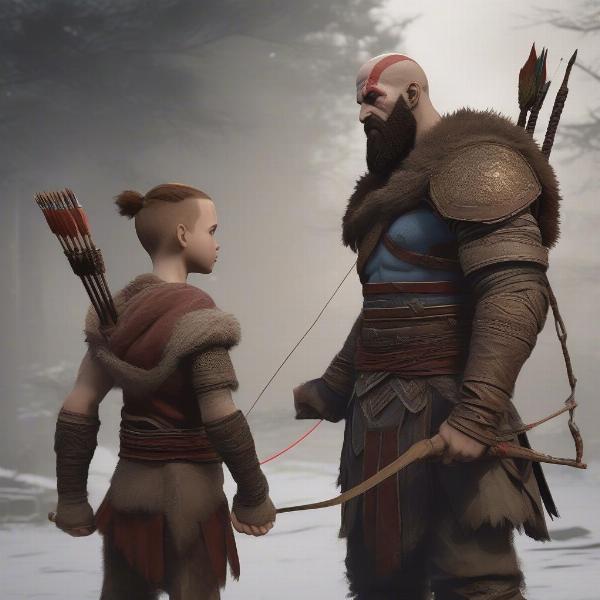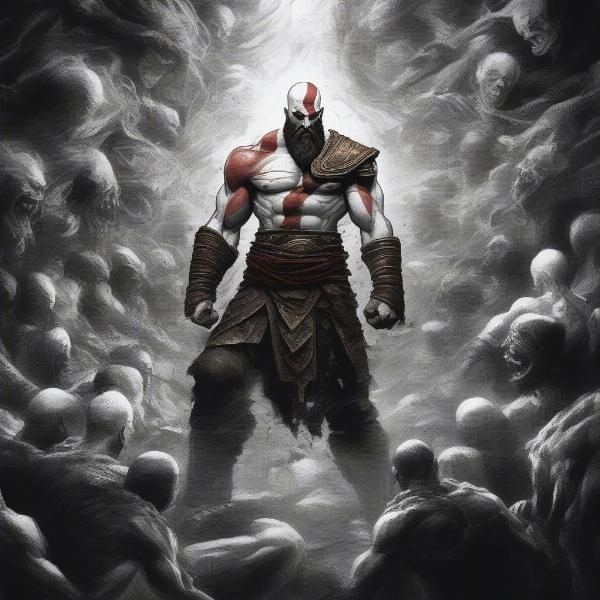Welcome to SupremeDuelist.blog, your premier destination for deep dives into the mechanics and narrative cores of the most influential games today. Today, we’re dissecting a crucial element of the God of War franchise – its persistent theme of personal betterment. Sony’s God of War series isn’t just about epic battles and mythological figures; it’s a journey of transformation, showcasing characters striving to be better, often in the face of immense personal turmoil.
This article explores the multifaceted ways the God of War games encourage growth, not only for Kratos, but also resonating with players. We’ll look at specific examples from across the series, examining how these instances of overcoming adversity and embracing change translate to a powerful, relatable message about self-improvement. We will analyze how these complex narratives can inspire us to reflect on our own lives and strive for positive change.
The Core of the God of War Theme: From Rage to Responsibility
The initial games in the God of War series, especially the Greek saga, portrayed Kratos as a force driven by rage and vengeance. He was a tragic figure, consumed by his past and seemingly incapable of escaping its clutches. His actions were brutal, his motives often selfish. However, this is not the entirety of the character’s arc. While the initial trilogy emphasized the destructive consequences of unchecked anger, it inadvertently laid the foundation for his later transformation. The core theme, even then, hinted at the possibility of a better Kratos, a better individual. This initial stage, though chaotic, is a crucial element in understanding how the overarching theme of betterment unfolds across the series. We witness a man hitting rock bottom, a necessary prerequisite for change. The transition isn’t instant or without its setbacks, making the theme all the more relatable to real-world struggles.
Kratos’s Journey of Change: A Slow and Deliberate Process
The shift from a god of war fueled by wrath to a father striving for guidance is a fundamental component of the series’ appeal. The Norse saga, starting with the 2018 reboot, showcases a Kratos who has left his past behind. He’s still scarred, still carrying the weight of his sins, but now he’s trying, with varying levels of success, to shield his son, Atreus, from the same darkness. This slow and deliberate process is where the “be better” message truly takes root. It’s not about erasing past mistakes; it’s about learning from them and ensuring they don’t dictate your future. The game highlights the continuous process of growth and the often frustrating nature of trying to overcome deeply ingrained patterns.
The Importance of Mentorship and Learning from Past Mistakes
A crucial aspect of the “be better” theme is Kratos’s role as a mentor to Atreus. He is actively trying to teach his son not just how to survive, but how to live with honor and respect. Kratos, as a character, is a complex individual, and this complexity is also visible in his teaching methods. This is particularly noteworthy given his own history. His attempts, although flawed, display his genuine desire for Atreus to become someone better than he once was, and sometimes, still struggles to be. In real life, much like in the game, the path to self-improvement is often paved with the support of others.
How Atreus’s Character Supports the “Be Better” Theme
Atreus isn’t simply a passive recipient of Kratos’s wisdom. He also challenges his father, pushing him to confront his anger and make choices that reflect growth. Atreus often serves as the moral compass in their relationship, forcing Kratos to reassess his traditional violent instincts. This dynamic interplay highlights a core aspect of self-improvement: it’s not a one-way street. It requires a willingness to listen, learn, and adapt – even when the source of feedback is a child who is still learning about the world themselves. The dynamic of mentorship in God of War shows that growth is rarely achieved in isolation, often requiring those around us to help us see our own flaws.
 Atreus Training with Kratos and Learning Self-Improvement
Atreus Training with Kratos and Learning Self-Improvement
Overcoming Internal Conflict and Embracing Vulnerability
Kratos’s transformation is not solely about external battles; it’s also about his internal conflict. He struggles constantly with his rage, his past traumas, and the fear of repeating the same mistakes. The God of War games highlight the importance of acknowledging inner demons and confronting them head-on. This is a crucial aspect of the “be better” theme: genuine improvement requires a level of vulnerability. Kratos must open up to Atreus and confront his inner turmoil if he ever truly wants to change. The game demonstrates the strength found in vulnerability and the power of facing oneself with honesty. This is an element that resonates with players who are also dealing with their own conflicts and imperfections.
The Role of Emotional Storytelling in Promoting Change
The emotional narrative, woven throughout the series, is a key factor in promoting the “be better” theme. We, as players, don’t just watch Kratos’s transformation, we experience it alongside him. We feel his anger, his fear, and his tentative steps towards compassion. This is an important part of the appeal for most of us, because the narrative makes us feel as though we too can overcome our own internal conflicts.
“The brilliance of God of War lies in its ability to portray self-improvement not as a linear path but as a messy, ongoing process,” notes Dr. Eleanor Vance, a specialist in narrative psychology. “Kratos’s story is a compelling reminder that growth often requires facing difficult truths about ourselves.”
 Kratos Confronting Inner Demons and Past Traumas
Kratos Confronting Inner Demons and Past Traumas
Practical Applications of “Be Better” in Gaming and Life
The God of War series teaches us that personal betterment isn’t a singular achievement but a consistent journey. This is a concept that extends beyond the game itself. It encourages players to reflect on their own lives, to acknowledge their imperfections, and to strive for progress, no matter how challenging it might be.
What Does “Being Better” Mean in the Context of God of War?
In God of War, “being better” does not necessarily mean becoming a saint. It’s about making conscious choices that align with growth, taking responsibility for one’s actions, and striving to learn from mistakes. Kratos doesn’t simply abandon his violent nature; he channels it into protecting those he cares for. It’s an active process of self-awareness and conscious effort toward improvement. This nuanced portrayal of self-betterment is what makes the game so impactful.
“Games like God of War can offer a safe space to explore complex emotions and themes,” explains renowned game design expert, James Sterling. “The ‘be better’ message resonates because it shows the internal struggles alongside the external ones, which all of us can relate to.”
Conclusion: God of War’s Enduring Message of Self-Improvement
The “be better” theme within Sony’s God of War games is a powerful narrative that transcends the typical action-adventure genre. It showcases a character’s journey through internal and external conflict, emphasizing the importance of mentorship, vulnerability, and the constant pursuit of personal growth. This consistent theme, explored in detail on SupremeDuelist.blog, encourages players to examine their own lives and strive for betterment, reinforcing the idea that improvement is an ongoing and attainable goal for everyone. We hope this breakdown has highlighted that the power of video games can go beyond entertainment, offering valuable lessons and encouraging us to confront our challenges with determination. Explore SupremeDuelist.blog for more insightful game analysis.
What steps are you taking to improve today?
Leave a Reply